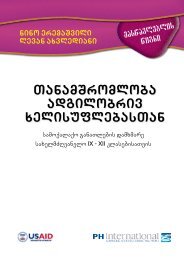The Geneva Protocol, by David Hunter Miller
The Geneva Protocol, by David Hunter Miller
The Geneva Protocol, by David Hunter Miller
You also want an ePaper? Increase the reach of your titles
YUMPU automatically turns print PDFs into web optimized ePapers that Google loves.
CHAPTER XVI. 64<br />
CHAPTER XVI.<br />
THE DISARMAMENT CONFERENCE.<br />
Under Article 17 of the <strong>Protocol</strong>, a Disarmament Conference to which all States of the world are to be invited<br />
is to meet at <strong>Geneva</strong> on June 15th, 1925. It is made the duty of the Council to draw up a general programme<br />
for reduction and limitation of armaments to be laid before the Conference and to be communicated to the<br />
various Governments not later than March 15th, 1925. <strong>The</strong> provision to this effect says that the Council shall<br />
give due regard to the undertakings of the <strong>Protocol</strong> regarding sanctions, but the preparation of this general<br />
programme is in substantial accord with Article 8 of the Covenant.<br />
<strong>The</strong> Assembly adopted a quite elaborate resolution[1] regarding this Conference. This resolution makes seven<br />
or eight suggestions in general terms for the agenda of the Disarmament Conference. While the resolution was<br />
adopted, it was pointed out in the discussion that the Council has a perfectly free hand in the matter and that<br />
the requests of the Assembly regarding the agenda were nothing more than requests. <strong>The</strong>re is perhaps no<br />
occasion to go over them in detail, but one or two points may be mentioned.<br />
<strong>The</strong> matter of demilitarized zones figures in this Assembly list. As such zones are specifically mentioned in<br />
Articles 9 and 10 of the <strong>Protocol</strong> there is no doubt that this is one of the questions that would be on the<br />
agenda. Another suggestion of the Assembly for the agenda of the Conference is "the control and<br />
investigation of armaments in the contracting States." Such control and investigation were a part of the<br />
so-called American Plan,[2] and in view of the fact that the control and investigation of the armaments of the<br />
former enemy States are now before the League, there can be no doubt that this matter also would be on the<br />
agenda of the Disarmament Conference prepared <strong>by</strong> the Council.<br />
{98}<br />
It was pointed out previously[3] that the date of the Disarmament Conference may be postponed. It now<br />
seems very likely that it will be.[4] Indeed, I feel that there was a little too much optimism at <strong>Geneva</strong> in fixing<br />
the date as early as June 15th, 1925, involving the completion of a programme <strong>by</strong> March 15th.<br />
Of course, in getting up a programme of general disarmament, and an agenda for the Conference on<br />
Disarmament, it is true that the Council would have available the advice of the Permanent Military<br />
Commission and of the different bureaus of the Secretariat. Even so, the task of finishing these preparations in<br />
three or four months, getting them approved <strong>by</strong> the Council and also <strong>by</strong> at least the chief of the interested<br />
Governments, is one that seems to me to be very doubtful of accomplishment.<br />
It is perhaps not generally understood what an amount of work and how great a number of questions are<br />
involved in such discussions as are proposed. <strong>The</strong>re are something like twenty European Governments that are<br />
vitally interested. Some of these Governments have quite different points of view and all of them have their<br />
military, naval, air and chemical programmes in force and subject to the control of their own Parliaments.[4]<br />
<strong>The</strong> idea of a general reduction of armaments involves, at least provisionally, the recasting of the entire<br />
military system of Europe. It is complicated <strong>by</strong> numerous possibilities of regional agreements which in<br />
themselves would create new problems of complexity.<br />
Furthermore, it is not generally recognized that a great deal of the work of such a Conference as this has to be<br />
done in advance. Doubtless no Conference in plenary session ever drew up a paper; no Legislature ever wrote<br />
a law. <strong>The</strong> utmost that any such body can do is to consider concrete proposals drawn up often <strong>by</strong> one<br />
individual, but certainly always <strong>by</strong> very small groups. I venture to say that ten lawyers could hardly draw a<br />
{99} deed without appointing a sub-committee. <strong>The</strong> success or failure of the Disarmament Conference will<br />
very largely depend on the care and judgment used in the preparations for its meeting.
















